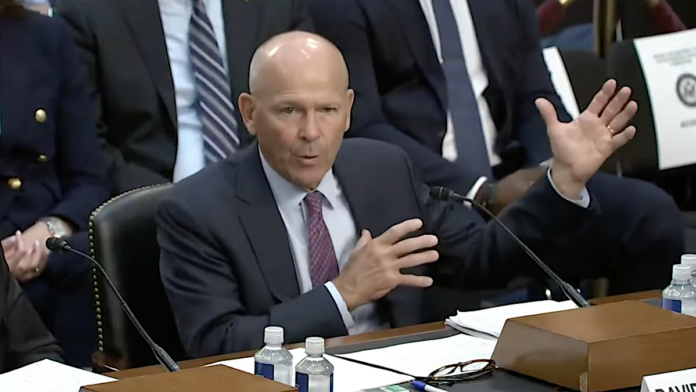
(States Newsroom) — Boeing CEO David Calhoun on Tuesday apologized to the families of people who died in crashes in the manufacturer’s planes, while members of both parties on a U.S. Senate panel grilled the executive for failing on safety and transparency.
Calhoun appeared at a hearing of the Investigations Subcommittee of the Senate Homeland Security and Government Affairs Committee to discuss recent failings of Boeing jets and the company’s treatment of whistleblowers.
Democrats and Republicans on the panel said Calhoun was more concerned about the company’s profits than its safety record.
“Boeing needs to stop thinking about the next earning call and start thinking about the next generation,” subcommittee Chair Richard Blumenthal, a Connecticut Democrat, said in an opening statement.
Missouri Republican Sen. Josh Hawley was among the sharpest questioners of Calhoun, starting off with a question about the CEO’s compensation, which is nearly $33 million per year.
“Mr. Calhoun, you’re not focused on safety,” Hawley said. “You’re not focused on quality. You’re not focused on transparency.
“I think actually, you’re focused on exactly what you were hired to do, which is that you’re cutting corners,” Hawley continued. “You are eliminating safety procedures. You are sticking it to your employees. You are cutting back jobs because you’re trying to squeeze every piece of profit you can out of this company. You’re strip-mining it. You’re strip-mining what was one of the greatest American companies ever.”
Calhoun should resign, Hawley said.
Calhoun is leaving the company at the end of the year.
Apology to families
Shortly after Blumenthal introduced him, Calhoun stood and turned to face spectators in the hearing room. His audience included the families of passengers who died on Lion Air Flight 610 in Indonesia in October 2018 and Ethiopian Airlines Flight 302 in March 2019.
Both crashes were caused by software issues on Boeing’s then-new 737 MAX aircraft.
“I would like to apologize on behalf of all of our Boeing associates spread throughout the world, past and present, for your losses,” Calhoun told the families.
“They’re gut-wrenching. And I apologize for the grief that we have caused. And I want you to know we are totally committed, in their memory, to work and focus on safety for as long as we’re employed by Boeing.”
Calhoun, who took over as Boeing’s chief executive in January 2020 after former CEO Dennis Muilenburg was fired following the two MAX crashes, largely accepted responsibility on behalf of the company for those crashes and a January 2024 episode that saw a door come off of a plane during an Alaska Airlines flight taking off from Portland, Oregon.
Calhoun said the aviation industry depends on accountability, transparency and continuous learning. The company must have a perfect record and cannot allow a single flawed airplane to leave its factory, he said.
“Perfection is what our job is,” he said. “And it has to be absolute.”
Boeing is headquartered in Virginia, but has manufacturing facilities across the country, including in Washington state, where it was founded, Missouri and South Carolina.
Culture still an issue
Calhoun was deferential throughout the hearing, largely accepting lawmakers’ criticism of his management, and pledged improvement.
But several members of the panel said his words were not enough.
Four years after taking over, Calhoun had not fixed a failing safety culture, New Hampshire Democrat Maggie Hassan said.
“You talk about safety and culture, but you aren’t answering the question about what the root causes are here,” Hassan said. “How do you make sure that safety and quality are your product as opposed to your words?”
While accepting responsibility for the Alaska Airlines incident, Calhoun answered that the safety record in general was positive, with 2023 the safest year on record for aviation travel.
Whistleblower retaliation
Also in the audience Tuesday were the mother and brother of John Barnett, a former Boeing engineer who was a whistleblower about safety issues at the company and died of suicide earlier this year.
Blumenthal described the “immense pressure” Barnett was under because he was helping investigate Boeing. Barnett received 19 calls from his manager one day and 21 the next, including a threat to “break” him, according to Blumenthal.
The committee has heard from “more than a dozen” whistleblowers from Boeing’s workforce, Blumenthal said. They routinely reported that raising concerns internally could result in intimidation, Blumenthal said.
The company has also been uncooperative with the subcommittee, Blumenthal said.
In response to requests for information, Boeing responded with pages of “complete gobbledygook,” which were impossible to read, Blumenthal said.
“I would describe it precisely as you did and I can’t justify it,” Calhoun said. “And I will definitely follow up.”
Ranking Republican Ron Johnson asked Calhoun if he had investigated the company’s incentive structure in response to reports from whistleblowers.
“It’s actually quite shocking to have a supervisor calling somebody up 19 times in one day, with the statement that ‘I’m going to break you,’” the Wisconsin Republican said. “My guess is you don’t condone that kind of behavior. Have you looked at your incentive system?”
Calhoun answered that the company made “significant changes to our incentive structure that really emphasizes all things safety.”
Johnson then asked if the company’s focus on diversity, equity and inclusion programs meant a tradeoff for quality performance.
“I’ve never seen those two things ever come into conflict,” Calhoun said.
Possible DOJ action
The U.S. Justice Department is conducting its own investigation and may pursue a criminal prosecution, Blumenthal said.
Blumenthal, a former federal prosecutor, said he thought there was enough evidence of wrongdoing to pursue a prosecution.
Blumenthal, Johnson and other members of the panel said lawmakers and the traveling public all wanted to see the aerospace manufacturing giant succeed. Boeing manufactures most of the airlines in commercial service in the U.S. and also has significant military contracts.
But the company’s success would “require a course correction,” Blumenthal said.
A federal prosecution of those responsible for safety failures would be a good start, he added.
“I’m saying to you, and I’m saying to the Department of Justice, individuals should be held accountable because that’s the only way that deterrence works,” Blumenthal said. “Wouldn’t you agree?”
“Yes, sir,” Calhoun responded. “I believe strongly in accountability.”






